On September 7, 1940, on a beautiful hot day, London lost its inviolability. The Third Reich launched operations Blitz, the first point of which was to send nearly 1,000 aircraft over the capital of Great Britain.
The day was warm and calm, and there was a cloudless sky above the falling mist. In the afternoon, the temperature passed thirty degrees Celsius, which is rare in London. Crowds appeared in Hyde Park, where people were lounging on sun loungers along the shores of Lake Serpentine. Many shoppers visited the shops on Oxford Street and Piccadilly. Powerful barrage balloons floating in the sky cast deep shadows on the streets.
End of inviolability
After the August air raid, when the bombs first fell on London itself, the city was basking again in an illusion of inviolability, broken only from time to time by false alarms that were once frighteningly new and were now less and less thrilling as bombers never fired. appeared. The heat of late summer additionally heightened the feeling of lazy peace. The theaters in the West End staged 24 plays, including the play Rebekah based on the novel of the same title, transferred to the theater by the author herself Daphne du Maurier . A film adaptation of the novel by Alfred Hitchcock, starring Laurence Olivier and Joan Fontaine, was also shown in London cinemas. Other movies on the screens at the time were Chasing the Shadow and played for a long time The Fading Flame .
The wonderful weather was an invitation to go out into nature. Churchill was then in Checkers.
The Luftwaffe arrived at tea time.
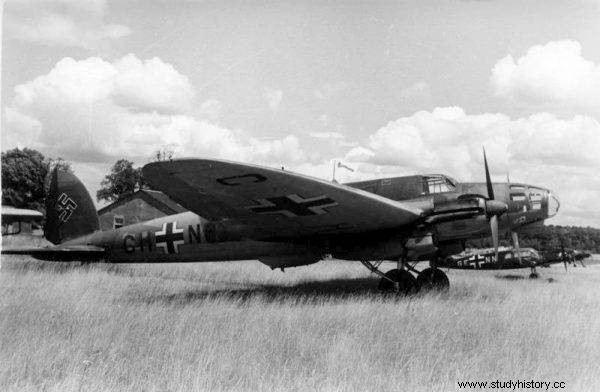
At the helm were the eight best-equipped Heinkel bombers belonging to KGr 100
The bombers approached in three waves, the first of which consisted of almost a thousand aircraft - 348 bombers and 617 fighters. At the head were eight best-equipped Heinkel bombers belonging to KGr 100 unit, carrying high-explosive and incendiary bombs ( Flammenbomben ) and with delayed ignition - the latter prevented the firefighters from approaching the fire at the site of the explosion. Despite the cloudless weather and a bright day, they used a radio guidance system to navigate. The first sirens sounded in London at 4:43 PM. At the helm were the eight best-equipped Heinkel bombers belonging to KGr 100
Writer Virginia Cowles and her friend Anne were then at the home of British newspaper magnate Esmond Harmsworth, in the village of Mereworth, about fifty kilometers southeast of London. They were sitting on the grass, drinking tea and soaking up the warmth and sunshine, when suddenly a low murmur was heard from the southeast side.
"We couldn't find anything at first," Cowles wrote, "but soon the sound began to intensify and turned into a deep roar like a distant, powerful waterfall."
The women counted over one hundred and fifty planes - bomber formation with surrounding fighters creating a protective shield around them.
"We were lying in the grass, straining our eyes and staring at the sky. We noticed a group of small white points resembling a swarm of insects. They were moving northwest, towards the capital. "
Cowles was surprised that the RAF was not intercepting German planes. She guessed the enemies had somehow managed to break through the English defense.
"Unfortunate London," said her friend.
Purpose? London!
Cowles had rightly observed that the German planes faced no particular resistance, but was wrong as to why. The RAF, alerted by radars that a large number of bombers were crossing the channel, directed fighter squadrons to defensive positions over key airfields, assuming that they would again be the main target of the attack. Anti-aircraft guns were also withdrawn from London and deployed near airports and other strategic facilities. Only 92 of them remained in the city center.
As soon as the RAF realized the city was the actual target, its fighters began to align with German planes. One of the RAF pilots, seeing the attackers, was shocked:
"I've never seen so many planes," he wrote. “The fog was up to about four thousand eight hundred meters that day. When we got through it, we couldn't believe our eyes. Everywhere you look, you could see only German planes coming in waves ”.
It looked just as stunning from the ground. Eighteen-year-old Colin Perry was riding his bicycle when the first wave of bombers appeared overhead. He later reported:
"It was an amazing, impressive and emotional sight. There were literally hundreds of German planes directly above me! They filled the entire sky. The fighters stayed close to them like bees around their queen. ”
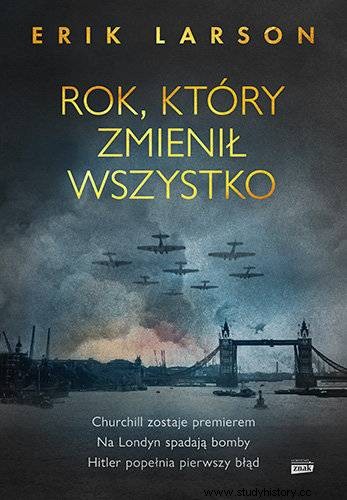
The text comes from the book by Erik Larson "The Year that Changed Everything", which was published by the Znak Horyzont publishing house
In the South East London neighborhood of Plumstead, architecture student Jack Graham Wright was just having tea with his family. His mother walked into the living room carrying a silver-finished tray containing cups, saucers, a milk jug, and a teapot in the warmer to keep the drink warm. That was when the sirens sounded. At first the family was not particularly concerned, but when Wright and his mother looked out the door, they saw the planes filling the entire sky . His mother also noticed "little bright dots falling" and realized they were bombs. They both hid under the stairs as quickly as possible.
"We've all heard the rising crescendo of aircraft engines and the ever closer series of thuds" - mentioned Wright.
Characteristic dust
The house started shaking and the floorboards started bouncing. Everyone felt the shock waves coming from the ground. Wright gripped the doorframe to keep his balance. After a while, the noise and vibrations grew even stronger. "The air in the living room thickened and hazy, as if it had become a reddish-brown mist in an instant," he wrote.
The thick stone wall separating his house from the next one seemed to buckle, and the jamb he was holding on to tremble. The tiles that fell off the roof smashed the glass of the porch. "Heard windows and doors cracking throughout the house."
The trembling stopped. The wall was still standing. "The brown mist cleared, but everything was covered with a heavy brown dust that covered the floors with such a thick layer that you couldn't see the carpet underneath it." One detail stuck to the man's memory:“A small porcelain jug lying on its side. A trickle of milk dripped off the table and made a white stain in the dust on the floor. "
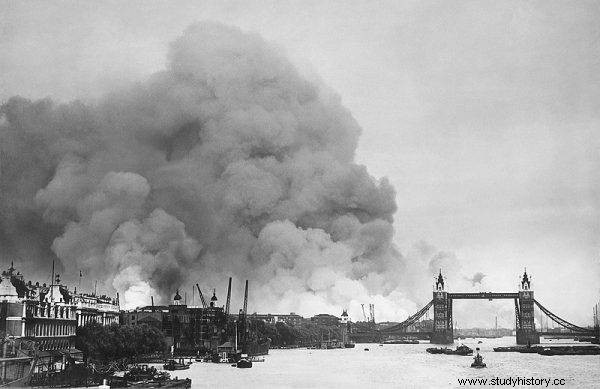
London in August 1940
It was this dust that many Londoners remembered as one of the most surprising elements of both this and later raids. As the buildings collapsed, clouds of powdered bricks, stone and plaster rose into the air from their eaves, attics, roofs, chimneys, stoves and fireplaces - dust from the time of Cromwell, Dickens and Queen Victoria. Detonation often happened only after the bomb had hit the ground right next to the buildings, which added sand and stones to the dust that filled the streets and filled the air with an ominous smell of fresh soil.
At first, the dust cut through the air quickly, like smoke from a cannon fire, but then it fell slowly and settled on sidewalks, streets, car windows, double-decker buses, telephone boxes and the bodies of the fallen. Like gray flour, it covered the survivors leaving the ruins from head to toe. Harold Nicolson described in his diary people immersed in "a thick fog that settled on everything, sticking a thick layer of dust on their hair and eyebrows."
It made dressing wounds difficult, as the doctor, Dr. Morton, quickly realized that Saturday night. "It was completely astonishing the enormous amount of dirt and dust that had accumulated over the centuries that had risen into the air in one blast," she wrote. All her knowledge of how to protect wounds from infection turned out to be useless. “Stone dust and dust covered their heads and stuck to their skin. There was nothing that could be done to prevent contamination. ”
It was especially unpleasant to see blood against that gray background, as the writer Graham Greene noticed one night as he watched soldiers leave the bombed building. "A terrible crowd of men and women in dusty, torn, bloody pajamas crashing against the door.
Red Sky
On Saturday at 5:20 pm Pug Ismay met with the chiefs of staff to discuss the consequences of the raid. At 6:10 PM the cancellation alarm sounded, but at 8:00 PM British radar detected a second wave of German planes gathering over French territory - 318 bombers. On July 20, British staff officers decided it was time to send the slogan "Cromwell" to inform all Home Forces units of the impending attack . Some local commanders even went so far as to order church bells to ring, signaling that the paratroopers had been spotted, but had not actually seen anything like it.
At 8:30 PM that evening, bombs fell on London's Battersea, but the city's anti-aircraft guns were still puzzlingly silent. Their first shots were heard only half an hour later, and then repeated only from time to time. After dark, the RAF fighters returned to their bases and remained there, being useless in the dark.
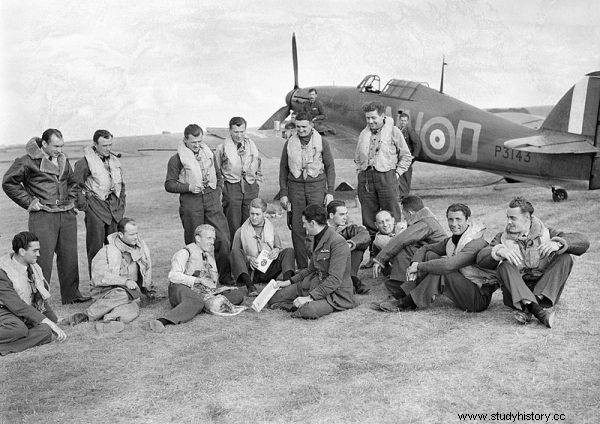
RAF pilots
The bombing continued all night. Anyone who dared to go outside had a chance to see the sky glowing red. Firefighters fought huge fires, but with poor results, so the German pilots had no problem finding the city. There was cheering on the German radio. "Thick clouds of smoke stretch over the rooftops of the world's greatest city," said the announcer. He also noted that the pilots felt the shockwaves of the explosions even on board the planes. (Crews were instructed to remain at least two thousand meters - six and a half thousand feet - when dropping their largest bombs, Satan otherwise the force of the blast will reach them as well). "The heart of the British empire is defenseless against attack by the German air force," the announcer said. One of the German aviators wrote a report with a strong propaganda overtone:“The burning circle encompassed a city with millions of inhabitants! We reached the drop site in a matter of minutes. And where are those proud Albion fighters? ”.
That night, Londoners experienced their first experiences and impressions:the smell of cordite after the explosion, the sound of glass shattered into tiny pieces ... A resident of the capital, Phyllis Warner, a thirty-something teacher, keeping a detailed diary of life during the war, described the moment when she first heard the sound of a falling bomb:"A terrifying howl, resembling a train whistle, coming closer and closer, followed by a sickening blow that made the ground vibrate." Hoping whatever that would help, she covered her head with a pillow .

The text comes from the book by Erik Larson "The Year that Changed Everything", which was published by the Znak Horyzont publishing house
Writer Cowles recalled "the deafening roar of falling walls, like the roar of waves crashing on the shore." The worst, in her opinion, was the low, steady growl of many airliner engines, which reminded her of drilling a dental drill. Another writer, present in London that day, John Strachey, recalled the olfactory sensation caused by the explosions. He described them as "acute irritation of the nasal passages with powdered dust from demolished buildings." It was followed by "the hideous odor of escaping gas."
This is the end of the world
This night allowed people to see things from a different perspective. Joan Wyndham - later writer and diarist - went to the Kensington shelter, where around midnight she decided it was time to lose her virginity, and her fiancé Rupert should be part of this endeavor . "Bombs are wonderful. It's so exciting. However, since the opposite of death is life, I think I should surrender myself to Rupert tomorrow. " She did have a condom, but she was planning to go with her friend to the pharmacy for the popular spermicide called Volpar, in case the condom failed. "Sirens canceling the alarm sounded at five in the morning," she wrote. “They're also sirens summoning my beloved Rupert, I thought.”
The following afternoon, she realized her resolve, but the experience was not what she expected. "Rupert took off his clothes and I decided he looked terribly ridiculous naked and started giggling hysterically.
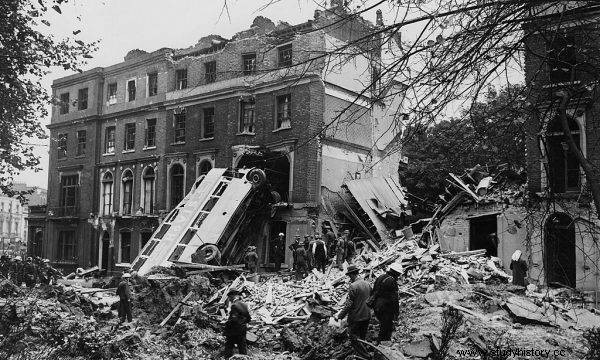
Residents of Mornington Crescent in Camden, upon waking, saw a double-decker bus stuck in a window on the second floor of the building.
- What happened? You don't like my penis? He asked.
- It's okay, just a little crooked!
- That's what it looks like for most men. Do not worry. Take off your clothes. ”
Later she recalled:“It's all over and I'm very happy about it! If that's what it's all about, I'd rather smoke a good cigarette or go to the movies. "
Dawn on Sunday 8 September showed a drastic contrast between the cloudless skies and the black wall of smoke above the East End. Residents of Mornington Crescent in Camden, upon waking, saw a double-decker bus stuck in a window on the second floor of the building. Above their heads, as far as the eye could see, hundreds of barrage balloons drifted with undisturbed freedom, slightly pink in the light of the rising sun. At 10 Downing Street, the personal secretary, John Martin, after spending the night in a vault underneath the building, stepped outside and was amazed:"London is still there."
Over four hundred people died in the night air raids and 1,600 were seriously injured. This was the first time many Londoners saw a dead body. When eighteen-year-old Len Jones dared to step out onto the rubble at the rear of his family home, he found two heads sticking out from under the rubble. “I especially recognized one of them. It was Chinese, Mr. Say. One eye was closed. It was only then that I began to realize that he was dead. " And a few hours earlier it was a quiet London neighborhood. “When I saw this dead Chinese man, I cringed and couldn't catch my breath. I was shaking all over. Later I figured that maybe I was dead as well, so I lit a match and burned my finger. I did this to see if I was still alive. I saw everything, but I thought it was impossible for me to live, that this is the end of the world. ”
The text comes from the book by Erik Larson "The Year that Changed Everything", which was published by the Znak Horyzont publishing house 
